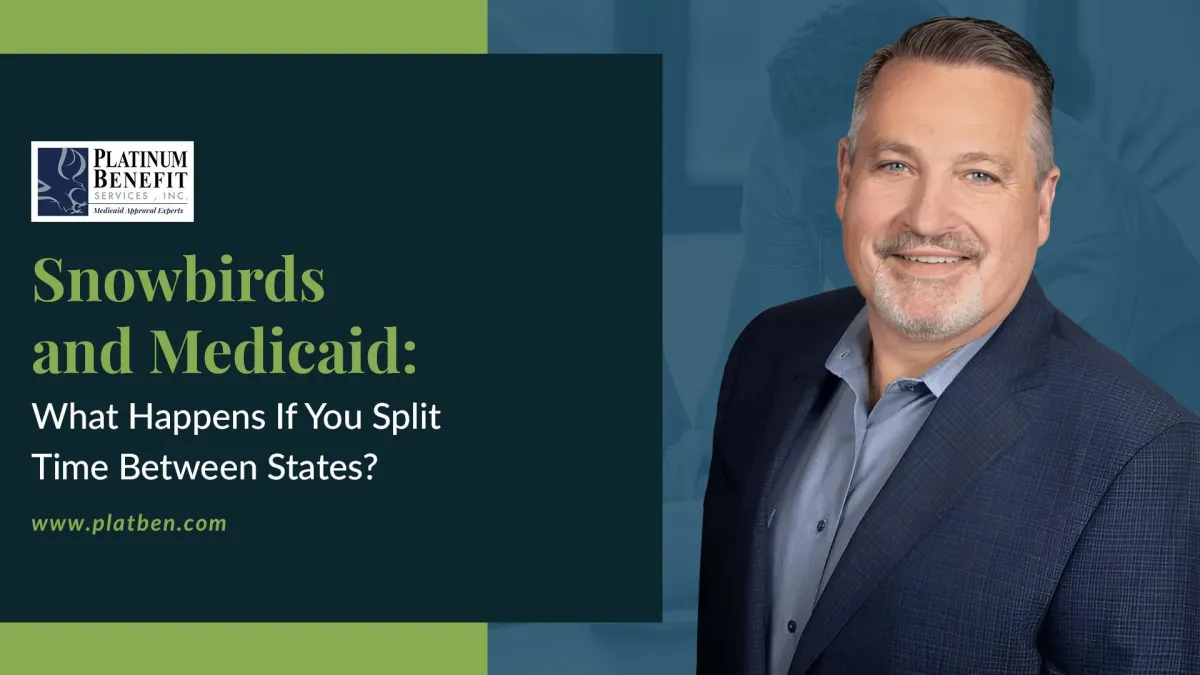
Medicaid for Snowbirds: Florida Residency Rules & Multi-State Planning
Many retirees split their time between Florida and another state, but what happens if long-term care is needed while away from their primary residence? In this episode of Medicaid Mastery, Florida Medicaid expert Antony Turberville explains how Medicaid determines residency, what happens when care is needed in a different state, and why moving between states can complicate Medicaid planning.
Understanding Medicaid Residency for Snowbirds
Antony clarifies that Medicaid is a joint federal and state program, but it is managed at the state level. For Medicaid purposes, residency is determined solely by physical presence. If someone needs long-term care while in Florida, they are considered a Florida resident—even if their primary home is in another state like New York.
However, you cannot apply for Florida Medicaid ahead of time in anticipation of moving. Applications can only be filed once the individual is physically in the state and meets the required health, citizenship, and financial criteria.
Why Switching Medicaid Between States Is Challenging
Antony explains that Medicaid benefits are not transferable between states. If a person leaves one state, they must disenroll from that state’s Medicaid program and reapply in the new state. This process must be repeated every time they relocate, making it impractical for individuals who require consistent long-term care.
He notes that while most people in nursing homes or assisted living facilities are unlikely to move frequently, this issue arises when families want to relocate a parent to be closer to them in another state. Unfortunately, the Medicaid disenrollment and reapplication process can create gaps in coverage and uncertainty.
Financial Implications of Moving Between States
Many families who hire Antony have assets that would disqualify them from Medicaid without professional planning. Florida offers more favorable asset protection strategies than many other states. For example, Alabama and Washington have stricter rules, meaning families may lose more assets if they relocate there.
Conversely, some states like California and New York are more flexible and allow easier qualification for Medicaid benefits. Still, Antony cautions that financial planning should be tailored to the specific state where long-term care is most likely to be needed.
Planning Strategies for Snowbirds
For snowbirds concerned about future Medicaid needs, Antony outlines two primary strategies.
Preplanning Five Years in Advance: Families can transfer assets to an irrevocable trust or loved ones well before care is needed. After five years, these assets are no longer counted for Medicaid eligibility, allowing greater flexibility to apply in any state. However, most families hesitate to give up control of their money that far in advance.
Choosing the Most Advantageous State: Instead of moving back and forth, families can decide which state offers the best Medicaid protection and stay there permanently once care becomes necessary.
Antony emphasizes the importance of consulting professionals early to understand each state’s Medicaid rules and protect as many assets as possible.
Unique Scenarios and Real-Life Cases
Antony shares examples of families who split their time between states. One case involved a client from Washington who had a stroke while in Florida and chose to remain there because Washington’s Medicaid rules were much stricter. In Florida, Antony was able to protect all of the client’s assets, whereas in Washington only a portion would have been saved.
While Florida is among the most favorable states for Medicaid planning, Antony reassures listeners that other states still allow families to preserve at least half of their assets with proper planning.
Preparing Your Family for Future Care Needs
For snowbirds and their families, Antony recommends education and proactive planning. Nursing home care in Florida can cost $13,000 to $14,000 per month, making it crucial to explore Medicaid eligibility before draining life savings. Families should know whom to call when care is needed and avoid paying out-of-pocket without first considering Medicaid or veterans’ benefits.
Veterans and their spouses may qualify for additional tax-free benefits through the VA, further helping reduce the financial burden of long-term care.
Final Advice for Snowbirds Facing Medicaid Decisions
Antony’s final advice for seasonal residents is simple: don’t wait until a health crisis forces quick decisions. Educate yourself on the options, determine which state offers the most beneficial Medicaid planning opportunities, and work with trusted professionals who understand the complexities of multi-state residency.
By taking proactive steps, families can protect assets, minimize stress, and ensure their loved ones receive the care they need without unnecessary financial hardship.


